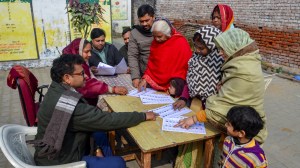State-run dairies losing out to private operators
NAGPUR, APRIL 21: State-run dairies are finding it increasingly difficult to sustain the stiff competition posed by the private operators,...

NAGPUR, APRIL 21: State-run dairies are finding it increasingly difficult to sustain the stiff competition posed by the private operators, thanks partly due to the myopic policies of the government and partly due to the flexibility of private operations.
A study of the steadily declining milk procurement in the region clearly establishes that the state endeavour is losing out to private operators like Dinshaws, Haldiram and the federation-run Mahananda. The problems of the state-run dairies have been compounded by the fact that the state government raised milk prices 8212; albeit perforce 8212; something that has come as a blessing in disguise for the private milk operators.
The situation is an irony of sorts. On the one hand, the state government is being sucked into the vortex of a vicious circle 8212; it raised milk prices on January 15 last to offset the losses due to lower procurement and found itself unwittingly playing into the hands of private operators. On the other hand, the private enterprise received a fillip, adding to the government8217;s woes.
The State decision to hike milk prices has affected the sales adversely as compared to the last year. The catch lies in the fact that the state has increased milk prices but not the procurement prices. All that the private operators had to do was to increase prices nominally and provide quality milk.
The problem does not lie in merely the quality aspect inasmuch as it does in the economics of procurement and sale. There is nothing wrong in the quality of milk supplied by state-run dairies 8212; or at least that is what the officials concerned would have the people believe. The farmers have now turned to private operators as they are getting spot payments for milk.
A senior official of the Regional Dairy Development office here said the state government was facing a tough competition from the private operators because of the hike in milk rates. Govt cow milk which was earlier available at Rs 11 per litre now costs Rs 12.50 per litre. This hike has drastically brought down the sale in the region.8217;
Before the hike was effected, the Nagpur Milk Scheme sold about 90,000 litres of milk in Nagpur alone via 500 agents. In Chandrapur and Wardha the figures were 30,000 litres and 5,500 litres respectively. In the post-hike scenario, the sale has been reduced to 60,000 litres in Nagpur and in Chandrapur and Wardha to 27,000 litres and 3,500 litres per day,8217; he informed. Evidently the Wardha district is the worst hit.
Even as the private operators are capitalising on the situation by default, the state government continues to be rigid in its operations. The private operators allow credit to the agents and also take returns,8217; of damaged bags. They are also not averse to compensate for leaking bags. We do not allow such concessions. Neither do we give credit to agents nor do we accept returns, he added.8217;
Pointed out the official, the government regulations are very clear on this. We take advance for the milk quota from the agents while the private operators are under no such compulsion. They can afford to change procurement rates as per the demand and supply8217;, the worried official said.
The milk from Mahananda Dairies of Maharashtra State Milk Federation, which has a stronghold in Western Maharashtra is concerned, he said, the Federation which entered Vidarbha in 1998, has a full-fledged plant near the city. Initially, Mahananda milk was available at Rs 12.50 per litre but later it reduced the price to Rs 11 per litre8217;.
This has resulted in a strange scenario where the state government has increased milk prices while the Federation reduced prices. The price cut has provided a boost to Mahananda whose sale zoomed from just 8000 litres to 31,000 litres in a short span of time,8217; he informed.
According to sources, the reason for Mahananda8217;s entry in the region was to give private operators a run for their money and to protect State interests. Now it is felt that Mhananda may take over state-run dairies in the region.
That the private operators stood to gain reflects in the Nagpur Milk Scheme procurement of just 88.9 thousand litres of milk in the year 1999-2000 8212; lowest in the last eight years. In the preceding year it was 109.3 thousand litres. The NMS reported highest procurement in 1996-97 when it procured 149.11 thousand litres of milk through farmers and district milk federations.
This drastic fall in milk procurement has also affected the chilling centres. The government has closed down two such centres 8212; Allapalli in Gadchiroli district and Samudrapur in Hinganghat Tehsil. We were receiving just 500 litres of milk from these centres and therefore we decided to shut these centres,8217; the official said.
Since last many years, the government has been giving concessions to district milk federations for dairy development in the region. But the beneficiaries of these district milk federations are private operators.
However, even in the midst of this loss-making phase, the state government is nursing plans for expansion. The Umred and Katol chilling centres are slated for completion soon. The machine-installation work is near complete there. The NMS is procuring 3,000 litres of milk from Katol and 2,000 litres from Umred in Nagpur district.
- 01
- 02
- 03
- 04
- 05































